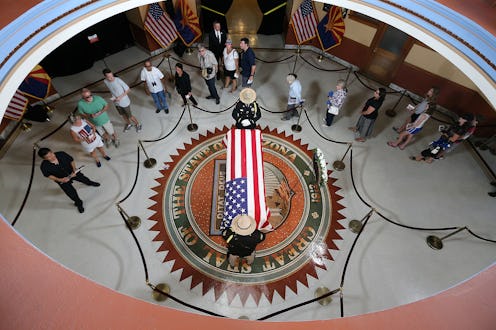News
Where John McCain Will Be Buried Breaks With Tradition For A Touching Reason

As his funeral approaches, people around the country are thinking about where John McCain will be buried — but it's not where you'd expect. Before his death, the former U.S. Naval officer, Senator from Arizona, and former Republican presidential contender chose to forgo a traditional burial at Arlington National Cemetery, where his father and grandfather — also military men — were laid to rest. Instead, in keeping with his maverick reputation, McCain opted to be interred next to his best friend, Adm. Charles Larson, on the lawns of the U.S. Naval Academy Cemetery in Annapolis, according to the Associated Press.
According to the book he published shortly before his death, The Restless Wave: Good Times, Just Causes, Great Fights, and Other Appreciations, McCain's burial spot is close to where he and Larson first met, on the bank of the Severn River, "back where it began." The pair both attended the academy, though while Larson graduated near the top of their class in 1958, McCain was close to the bottom. According to the AP, they were roommates through flight school, and remained close friends throughout their service in the Navy.
Larson, who died in 2014, went on to become the second-youngest admiral in the U.S. Navy's history, and was later named superintendent of the Naval Academy. In a speech McCain delivered in 1998 at the academy, he described his friendship with Larson as, "one of the great honors of my life," recounting his rebellious hijinks in school in contrast to Larson's more straitlaced record. According to the AP, Larson reserved four plots for himself, McCain, and their wives, on a grassy hill at the academy.
McCain battled brain cancer starting in 2017, during which he kept his Senate seat. Recognized for supporting right-wing policies, McCain was also known for not always following suit with his party. Though he voted against the Affordable Care Act in 2010, he was the dramatic deciding vote to preserve it in 2017. On top of that, he asked former president Barack Obama to deliver a eulogy at his funeral.
McCain and President Trump, on the other hand, had a publicly contentious relationship which continued after the senator's death. Trump initially refused to lower the White House flag to half staff beyond the day after McCain died, and reportedly rejected plans for a White House statement praising the senator. On Tuesday, reports surfaced that McCain chose a Russian dissident as one of his pallbearers in an apparent final jab at Trump (and Vladimir Putin). McCain's farewell statement, without mentioning the president by name, also appeared to warn the country against Trump's brand of populism.
"We weaken our greatness when we confuse our patriotism with tribal rivalries that have sown resentment and hatred and violence in all the corners of the globe," he wrote. "We weaken it when we hide behind walls, rather than tear them down; when we doubt the power of our ideals, rather than trust them to be the great force for change they have always been."
He even acknowledged the current national tumult, writing, "Do not despair of our present difficulties. We believe always in the promise and greatness of America because nothing is inevitable here."
On Wednesday, McCain's body lay in state at the Arizona Capitol in Phoenix, where the public is allowed to pay their respects. On Friday, his remains will be flown to Washington, for another viewing at the U.S. Capitol. There will be an invitation-only memorial service on Saturday at the Washington National Cathedral, after which he will be buried at the Naval Academy in Annapolis.